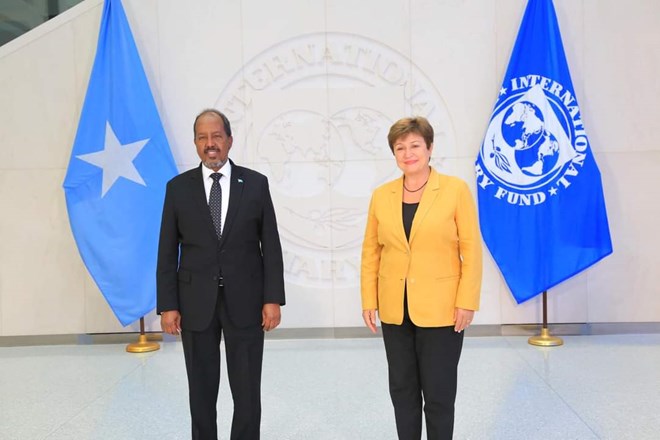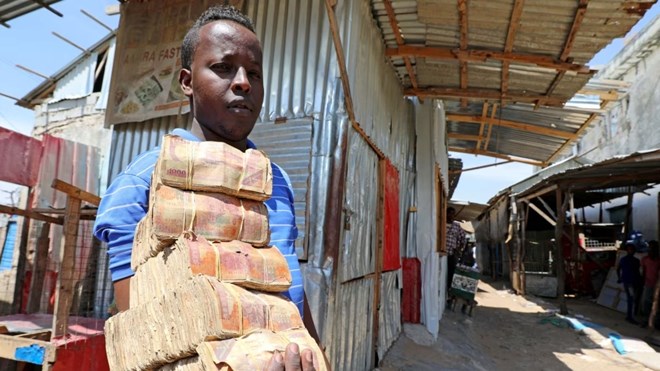
Wednesday December 13, 2023

New York (HOL) - The International Monetary Fund (IMF) and the World Bank's International Development Association (IDA) have approved a major debt relief package for Somalia under the Heavily Indebted Poor Countries (HIPC) Initiative. The relief amounting to US$4.5 billion marks a significant turnaround for the nation's economy, drastically reducing Somalia's external debt from 64% of its GDP in 2018 to less than 6% by the end of 2023, opening new avenues for economic growth, poverty reduction, and job creation.
This achievement is the result of a nearly decade-long effort across three political administrations in Somalia, emphasizing the nation's unwavering commitment to economic overhaul. "This is a testament to our national commitment and prioritization of this crucial and enabling agenda," stated Somalia's President, Hassan Sheikh Mohamud. "For Somalia to move forward in the positive economic direction we all needed, we had to reform our laws, systems, policies, and practices. Reaching the HIPC Completion Point is the fruit of these reforms."
Somalia's former President, Mohamed Abdullahi Farmajo, also welcomed the IMF's decision to lift the debt burden, adding that he was proud of his administration's economic reforms that helped pave the way to the HIPC completion point.
The relief package includes the Enhanced HIPC Initiative, the Multilateral Debt Relief Initiative (MDRI), additional IMF relief, and further aid from Paris Club creditors. It involves $3 billion from commercial creditors, with significant contributions from global organizations. The IDA contributes $448.5 million, the IMF $343.2 million, and the African Development Fund $131 million.The IMF Board also approved a new 3-year Extended Credit Facility (ECF) arrangement of about US$100 million, bringing Somalia's total disbursement under the ECF and the Extended Fund Facility (EFF) approved in 2020 to about US$ 388.7 million.
Victoria Kwakwa, the World Bank Vice President for Eastern and Southern Africa, also emphasized the World Bank's commitment to Somalia's ongoing reforms. "Reaching the HIPC Completion Point is a historic milestone for which the Somalia Government deserves full credit. Deepening structural reforms after the Completion Point will be critical to boost private sector growth and create fiscal space to invest more in human development and infrastructure."
Somalia's Minister of Finance, Bihi Iman Egeh, highlighted the reform journey's depth and breadth, "Despite external challenges such as regular climatic shocks and the ongoing fight against international terrorism, we are proud to have reached the HIPC Completion Point. Through our enabling reforms, we have consistently raised domestic revenue, strengthened public financial management, improved good governance and central banking operations, and enhanced the capacity of our national institutions."

FILE - A dealer carries bundles of the Somalian currency at an open air currency exchange within the Hamarweyne market in Mogadishu, Somalia, Feb. 5, 2020. The World Bank and IMF have approved a major debt relief package for Somalia. REUTERS
The IMF's Director for the Middle East and Central Asia, Jihad Azour, emphasized the importance of Somalia's achievement. "The Completion Point is a momentous achievement that restores debt sustainability and offers access to new external financing to support inclusive growth and poverty reduction," he commented.
Somalia is the 37th country to reach the HIPC Completion Point since the initiative's inception in 1996, aimed at helping the world's poorest and most heavily indebted countries. The MDRI, established in 2005, offers further support by providing complete debt relief from institutions like the IDA, IMF, and ADF to qualifying countries at the HIPC Completion Point.
Post-HIPC, Somalia plans to continue its reforms to foster resilience, inclusive growth, and poverty reduction. Despite facing a prolonged drought from 2020 to 2023 and global economic shifts, Somalia's economy demonstrates resilience, according to the World Bank. A biting drought severely impacted agriculture and exports, which led to significant migration as people sought food and water. The climate shock resulted in a decline in GDP growth to 2.4% in 2022, down from 3.3% the previous year. However, the forecast predicts an increase in GDP growth to 3.1% in 2023, with a potential rise to 3.8% by 2025.